Operational Improvements: Lean Management and TQM Report
VerifiedAdded on 2022/08/18
|17
|4494
|15
Report
AI Summary
This report delves into the critical topic of operational improvements, crucial for organizational success in a dynamic environment. It emphasizes the importance of operational efficiency, profitability, and sustainable programs. The report provides an in-depth analysis of two prominent approaches: Lean Management and Total Quality Management (TQM). Lean Management, with its focus on waste reduction and continuous improvement, is examined through its core principles and techniques like value stream mapping and Kanban. TQM, on the other hand, is explored in terms of its customer-centric approach, emphasizing continuous improvement across all departments and the importance of employee involvement. The report contrasts these two methodologies, discussing their strategies, applications, and the potential for enhanced performance in various organizational settings. It highlights the advantages of each approach, such as improved resource utilization, increased efficiency, and the ability to adapt to changing customer needs. The report concludes by underscoring the significance of these operational improvement strategies for achieving a competitive edge in the business landscape.
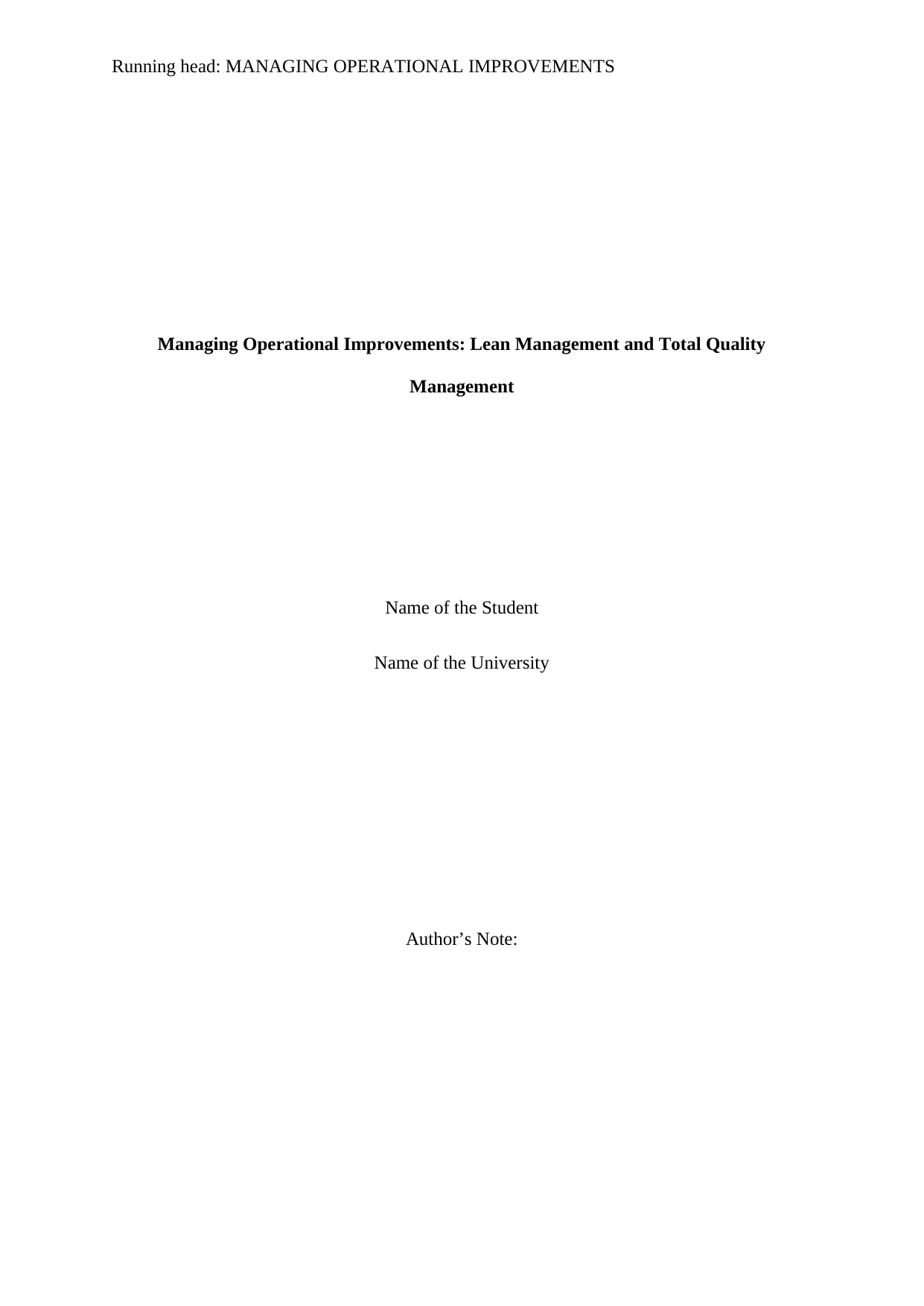
Running head: MANAGING OPERATIONAL IMPROVEMENTS
Managing Operational Improvements: Lean Management and Total Quality
Management
Name of the Student
Name of the University
Author’s Note:
Managing Operational Improvements: Lean Management and Total Quality
Management
Name of the Student
Name of the University
Author’s Note:
Paraphrase This Document
Need a fresh take? Get an instant paraphrase of this document with our AI Paraphraser
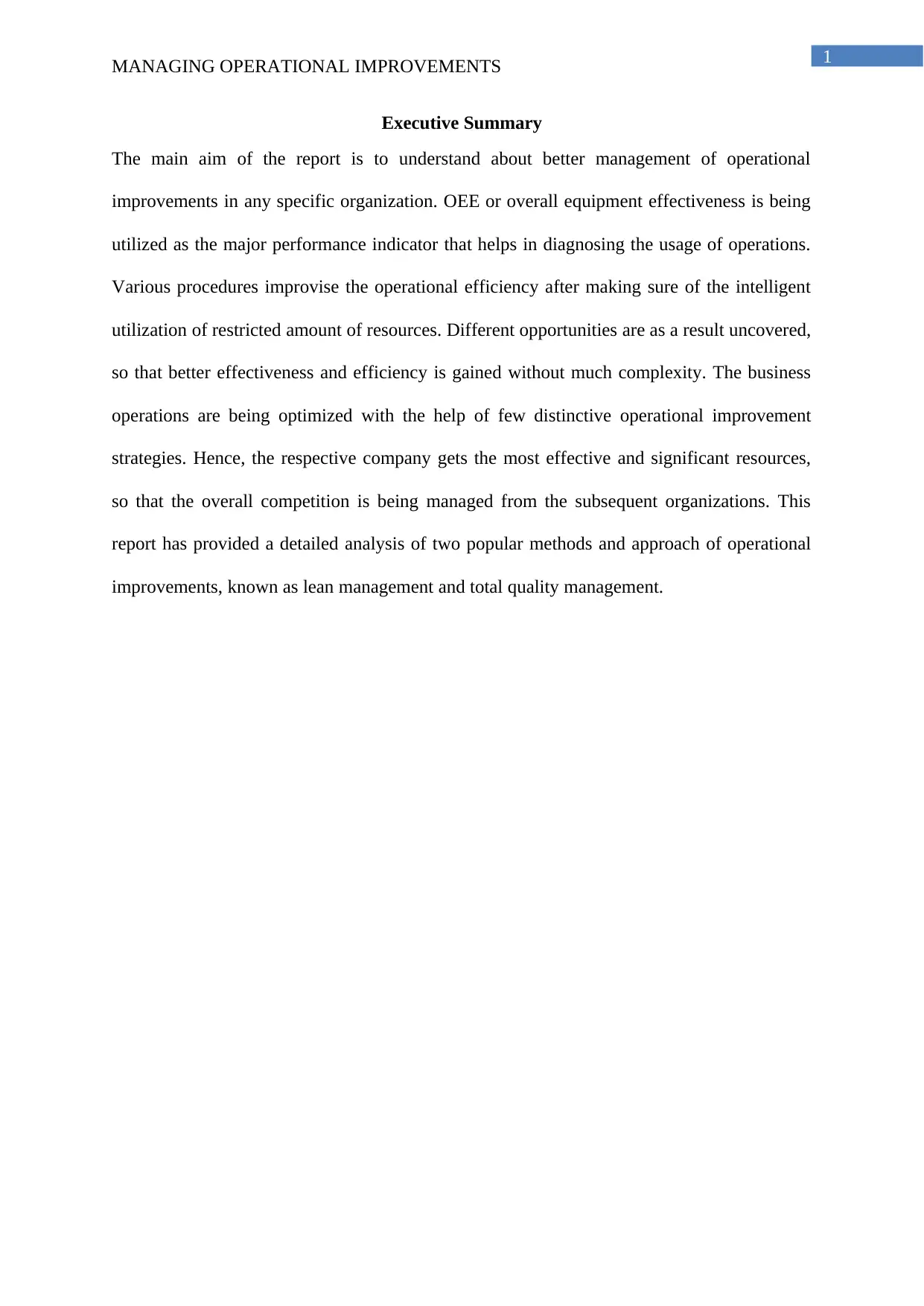
1
MANAGING OPERATIONAL IMPROVEMENTS
Executive Summary
The main aim of the report is to understand about better management of operational
improvements in any specific organization. OEE or overall equipment effectiveness is being
utilized as the major performance indicator that helps in diagnosing the usage of operations.
Various procedures improvise the operational efficiency after making sure of the intelligent
utilization of restricted amount of resources. Different opportunities are as a result uncovered,
so that better effectiveness and efficiency is gained without much complexity. The business
operations are being optimized with the help of few distinctive operational improvement
strategies. Hence, the respective company gets the most effective and significant resources,
so that the overall competition is being managed from the subsequent organizations. This
report has provided a detailed analysis of two popular methods and approach of operational
improvements, known as lean management and total quality management.
MANAGING OPERATIONAL IMPROVEMENTS
Executive Summary
The main aim of the report is to understand about better management of operational
improvements in any specific organization. OEE or overall equipment effectiveness is being
utilized as the major performance indicator that helps in diagnosing the usage of operations.
Various procedures improvise the operational efficiency after making sure of the intelligent
utilization of restricted amount of resources. Different opportunities are as a result uncovered,
so that better effectiveness and efficiency is gained without much complexity. The business
operations are being optimized with the help of few distinctive operational improvement
strategies. Hence, the respective company gets the most effective and significant resources,
so that the overall competition is being managed from the subsequent organizations. This
report has provided a detailed analysis of two popular methods and approach of operational
improvements, known as lean management and total quality management.
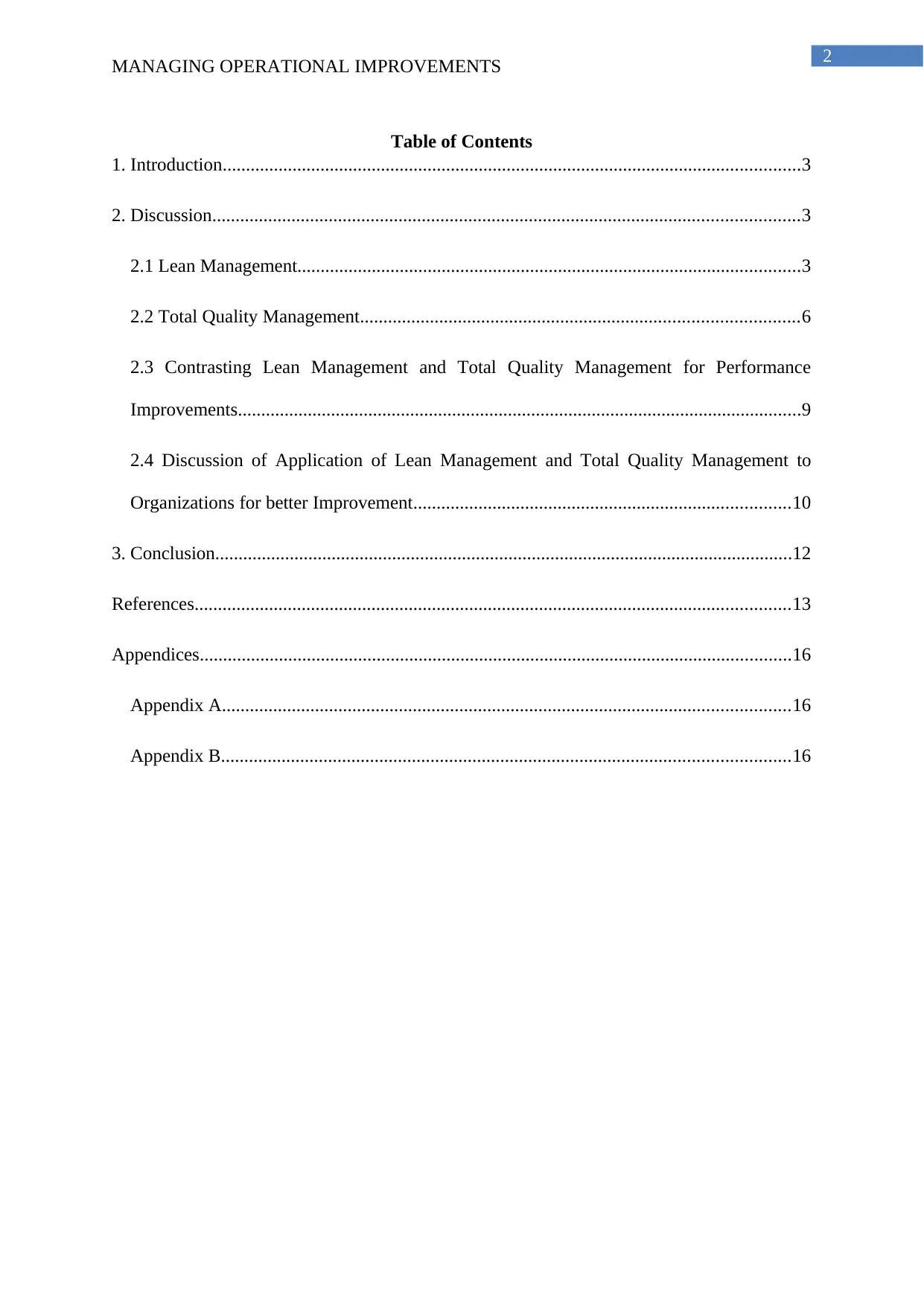
2
MANAGING OPERATIONAL IMPROVEMENTS
Table of Contents
1. Introduction............................................................................................................................3
2. Discussion..............................................................................................................................3
2.1 Lean Management............................................................................................................3
2.2 Total Quality Management..............................................................................................6
2.3 Contrasting Lean Management and Total Quality Management for Performance
Improvements.........................................................................................................................9
2.4 Discussion of Application of Lean Management and Total Quality Management to
Organizations for better Improvement.................................................................................10
3. Conclusion............................................................................................................................12
References................................................................................................................................13
Appendices...............................................................................................................................16
Appendix A..........................................................................................................................16
Appendix B..........................................................................................................................16
MANAGING OPERATIONAL IMPROVEMENTS
Table of Contents
1. Introduction............................................................................................................................3
2. Discussion..............................................................................................................................3
2.1 Lean Management............................................................................................................3
2.2 Total Quality Management..............................................................................................6
2.3 Contrasting Lean Management and Total Quality Management for Performance
Improvements.........................................................................................................................9
2.4 Discussion of Application of Lean Management and Total Quality Management to
Organizations for better Improvement.................................................................................10
3. Conclusion............................................................................................................................12
References................................................................................................................................13
Appendices...............................................................................................................................16
Appendix A..........................................................................................................................16
Appendix B..........................................................................................................................16
⊘ This is a preview!⊘
Do you want full access?
Subscribe today to unlock all pages.

Trusted by 1+ million students worldwide
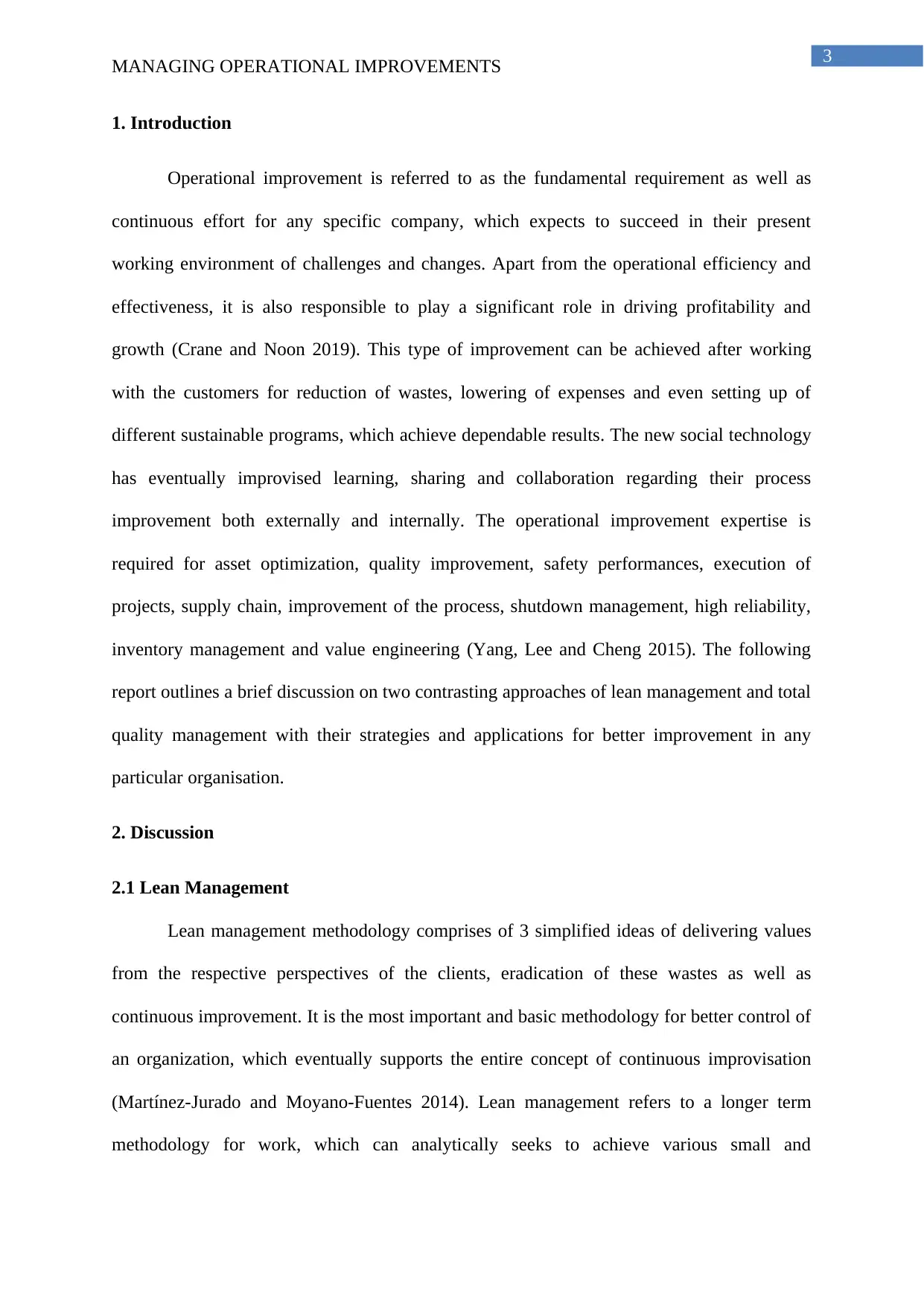
3
MANAGING OPERATIONAL IMPROVEMENTS
1. Introduction
Operational improvement is referred to as the fundamental requirement as well as
continuous effort for any specific company, which expects to succeed in their present
working environment of challenges and changes. Apart from the operational efficiency and
effectiveness, it is also responsible to play a significant role in driving profitability and
growth (Crane and Noon 2019). This type of improvement can be achieved after working
with the customers for reduction of wastes, lowering of expenses and even setting up of
different sustainable programs, which achieve dependable results. The new social technology
has eventually improvised learning, sharing and collaboration regarding their process
improvement both externally and internally. The operational improvement expertise is
required for asset optimization, quality improvement, safety performances, execution of
projects, supply chain, improvement of the process, shutdown management, high reliability,
inventory management and value engineering (Yang, Lee and Cheng 2015). The following
report outlines a brief discussion on two contrasting approaches of lean management and total
quality management with their strategies and applications for better improvement in any
particular organisation.
2. Discussion
2.1 Lean Management
Lean management methodology comprises of 3 simplified ideas of delivering values
from the respective perspectives of the clients, eradication of these wastes as well as
continuous improvement. It is the most important and basic methodology for better control of
an organization, which eventually supports the entire concept of continuous improvisation
(Martínez-Jurado and Moyano-Fuentes 2014). Lean management refers to a longer term
methodology for work, which can analytically seeks to achieve various small and
MANAGING OPERATIONAL IMPROVEMENTS
1. Introduction
Operational improvement is referred to as the fundamental requirement as well as
continuous effort for any specific company, which expects to succeed in their present
working environment of challenges and changes. Apart from the operational efficiency and
effectiveness, it is also responsible to play a significant role in driving profitability and
growth (Crane and Noon 2019). This type of improvement can be achieved after working
with the customers for reduction of wastes, lowering of expenses and even setting up of
different sustainable programs, which achieve dependable results. The new social technology
has eventually improvised learning, sharing and collaboration regarding their process
improvement both externally and internally. The operational improvement expertise is
required for asset optimization, quality improvement, safety performances, execution of
projects, supply chain, improvement of the process, shutdown management, high reliability,
inventory management and value engineering (Yang, Lee and Cheng 2015). The following
report outlines a brief discussion on two contrasting approaches of lean management and total
quality management with their strategies and applications for better improvement in any
particular organisation.
2. Discussion
2.1 Lean Management
Lean management methodology comprises of 3 simplified ideas of delivering values
from the respective perspectives of the clients, eradication of these wastes as well as
continuous improvement. It is the most important and basic methodology for better control of
an organization, which eventually supports the entire concept of continuous improvisation
(Martínez-Jurado and Moyano-Fuentes 2014). Lean management refers to a longer term
methodology for work, which can analytically seeks to achieve various small and
Paraphrase This Document
Need a fresh take? Get an instant paraphrase of this document with our AI Paraphraser
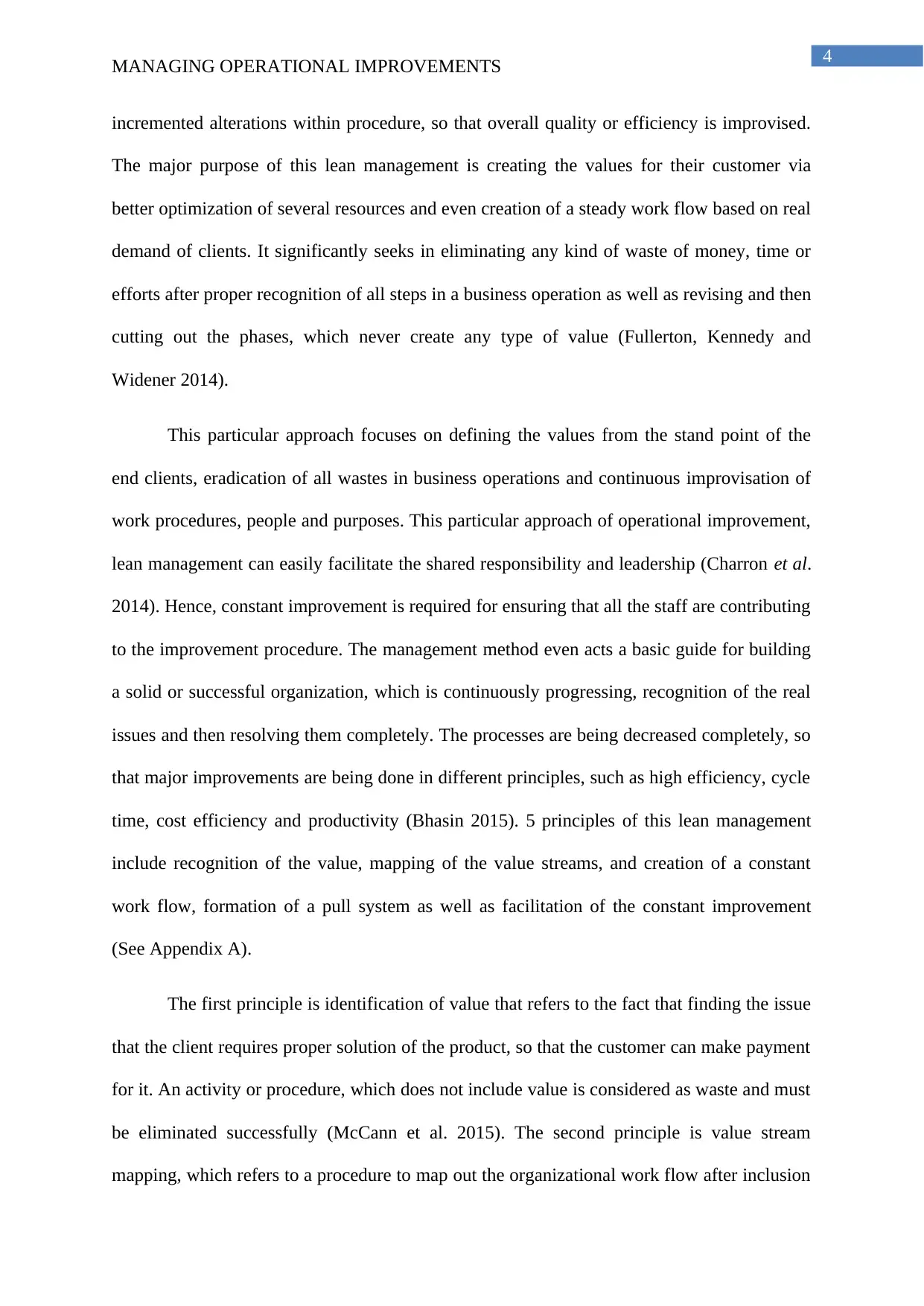
4
MANAGING OPERATIONAL IMPROVEMENTS
incremented alterations within procedure, so that overall quality or efficiency is improvised.
The major purpose of this lean management is creating the values for their customer via
better optimization of several resources and even creation of a steady work flow based on real
demand of clients. It significantly seeks in eliminating any kind of waste of money, time or
efforts after proper recognition of all steps in a business operation as well as revising and then
cutting out the phases, which never create any type of value (Fullerton, Kennedy and
Widener 2014).
This particular approach focuses on defining the values from the stand point of the
end clients, eradication of all wastes in business operations and continuous improvisation of
work procedures, people and purposes. This particular approach of operational improvement,
lean management can easily facilitate the shared responsibility and leadership (Charron et al.
2014). Hence, constant improvement is required for ensuring that all the staff are contributing
to the improvement procedure. The management method even acts a basic guide for building
a solid or successful organization, which is continuously progressing, recognition of the real
issues and then resolving them completely. The processes are being decreased completely, so
that major improvements are being done in different principles, such as high efficiency, cycle
time, cost efficiency and productivity (Bhasin 2015). 5 principles of this lean management
include recognition of the value, mapping of the value streams, and creation of a constant
work flow, formation of a pull system as well as facilitation of the constant improvement
(See Appendix A).
The first principle is identification of value that refers to the fact that finding the issue
that the client requires proper solution of the product, so that the customer can make payment
for it. An activity or procedure, which does not include value is considered as waste and must
be eliminated successfully (McCann et al. 2015). The second principle is value stream
mapping, which refers to a procedure to map out the organizational work flow after inclusion
MANAGING OPERATIONAL IMPROVEMENTS
incremented alterations within procedure, so that overall quality or efficiency is improvised.
The major purpose of this lean management is creating the values for their customer via
better optimization of several resources and even creation of a steady work flow based on real
demand of clients. It significantly seeks in eliminating any kind of waste of money, time or
efforts after proper recognition of all steps in a business operation as well as revising and then
cutting out the phases, which never create any type of value (Fullerton, Kennedy and
Widener 2014).
This particular approach focuses on defining the values from the stand point of the
end clients, eradication of all wastes in business operations and continuous improvisation of
work procedures, people and purposes. This particular approach of operational improvement,
lean management can easily facilitate the shared responsibility and leadership (Charron et al.
2014). Hence, constant improvement is required for ensuring that all the staff are contributing
to the improvement procedure. The management method even acts a basic guide for building
a solid or successful organization, which is continuously progressing, recognition of the real
issues and then resolving them completely. The processes are being decreased completely, so
that major improvements are being done in different principles, such as high efficiency, cycle
time, cost efficiency and productivity (Bhasin 2015). 5 principles of this lean management
include recognition of the value, mapping of the value streams, and creation of a constant
work flow, formation of a pull system as well as facilitation of the constant improvement
(See Appendix A).
The first principle is identification of value that refers to the fact that finding the issue
that the client requires proper solution of the product, so that the customer can make payment
for it. An activity or procedure, which does not include value is considered as waste and must
be eliminated successfully (McCann et al. 2015). The second principle is value stream
mapping, which refers to a procedure to map out the organizational work flow after inclusion
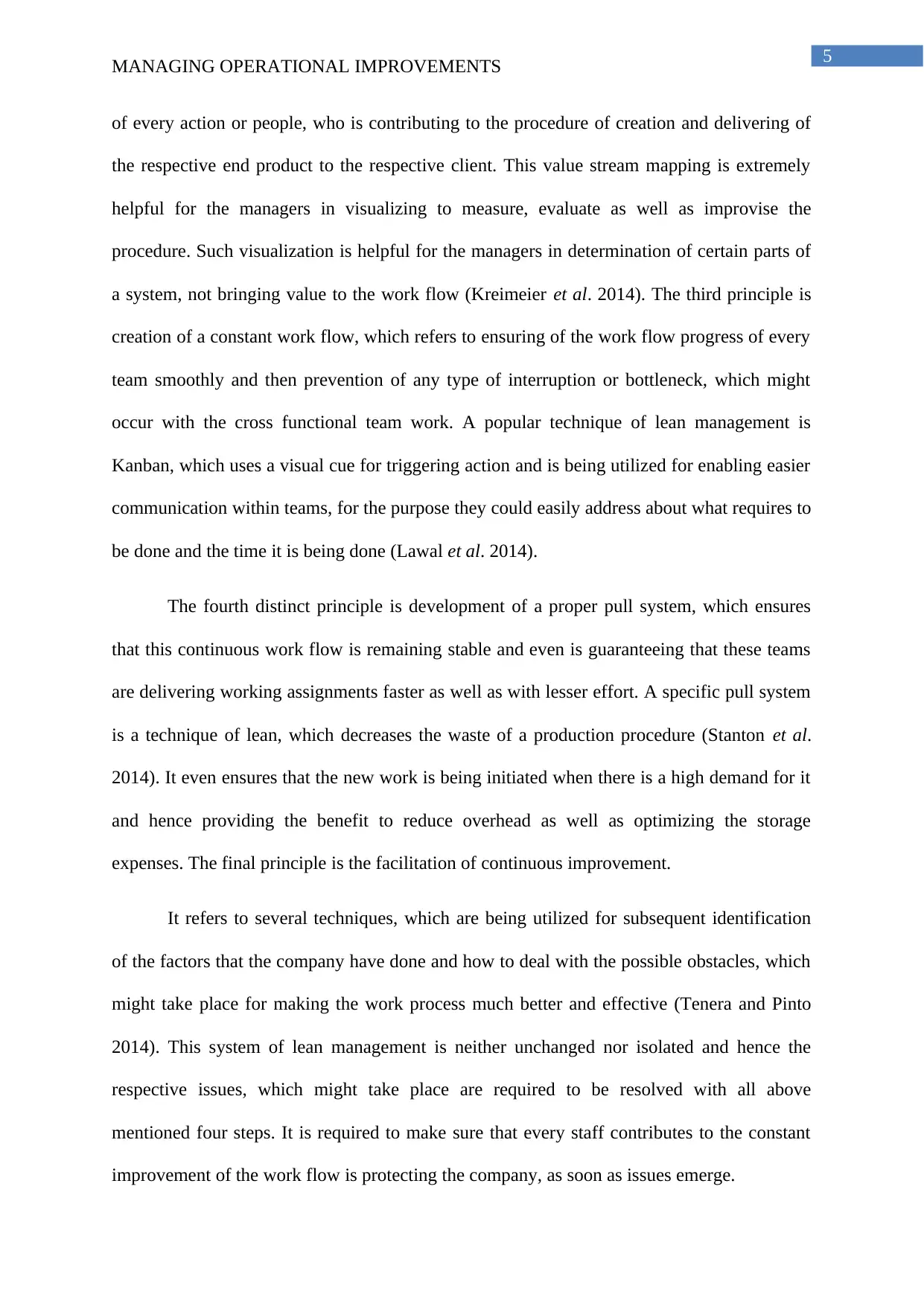
5
MANAGING OPERATIONAL IMPROVEMENTS
of every action or people, who is contributing to the procedure of creation and delivering of
the respective end product to the respective client. This value stream mapping is extremely
helpful for the managers in visualizing to measure, evaluate as well as improvise the
procedure. Such visualization is helpful for the managers in determination of certain parts of
a system, not bringing value to the work flow (Kreimeier et al. 2014). The third principle is
creation of a constant work flow, which refers to ensuring of the work flow progress of every
team smoothly and then prevention of any type of interruption or bottleneck, which might
occur with the cross functional team work. A popular technique of lean management is
Kanban, which uses a visual cue for triggering action and is being utilized for enabling easier
communication within teams, for the purpose they could easily address about what requires to
be done and the time it is being done (Lawal et al. 2014).
The fourth distinct principle is development of a proper pull system, which ensures
that this continuous work flow is remaining stable and even is guaranteeing that these teams
are delivering working assignments faster as well as with lesser effort. A specific pull system
is a technique of lean, which decreases the waste of a production procedure (Stanton et al.
2014). It even ensures that the new work is being initiated when there is a high demand for it
and hence providing the benefit to reduce overhead as well as optimizing the storage
expenses. The final principle is the facilitation of continuous improvement.
It refers to several techniques, which are being utilized for subsequent identification
of the factors that the company have done and how to deal with the possible obstacles, which
might take place for making the work process much better and effective (Tenera and Pinto
2014). This system of lean management is neither unchanged nor isolated and hence the
respective issues, which might take place are required to be resolved with all above
mentioned four steps. It is required to make sure that every staff contributes to the constant
improvement of the work flow is protecting the company, as soon as issues emerge.
MANAGING OPERATIONAL IMPROVEMENTS
of every action or people, who is contributing to the procedure of creation and delivering of
the respective end product to the respective client. This value stream mapping is extremely
helpful for the managers in visualizing to measure, evaluate as well as improvise the
procedure. Such visualization is helpful for the managers in determination of certain parts of
a system, not bringing value to the work flow (Kreimeier et al. 2014). The third principle is
creation of a constant work flow, which refers to ensuring of the work flow progress of every
team smoothly and then prevention of any type of interruption or bottleneck, which might
occur with the cross functional team work. A popular technique of lean management is
Kanban, which uses a visual cue for triggering action and is being utilized for enabling easier
communication within teams, for the purpose they could easily address about what requires to
be done and the time it is being done (Lawal et al. 2014).
The fourth distinct principle is development of a proper pull system, which ensures
that this continuous work flow is remaining stable and even is guaranteeing that these teams
are delivering working assignments faster as well as with lesser effort. A specific pull system
is a technique of lean, which decreases the waste of a production procedure (Stanton et al.
2014). It even ensures that the new work is being initiated when there is a high demand for it
and hence providing the benefit to reduce overhead as well as optimizing the storage
expenses. The final principle is the facilitation of continuous improvement.
It refers to several techniques, which are being utilized for subsequent identification
of the factors that the company have done and how to deal with the possible obstacles, which
might take place for making the work process much better and effective (Tenera and Pinto
2014). This system of lean management is neither unchanged nor isolated and hence the
respective issues, which might take place are required to be resolved with all above
mentioned four steps. It is required to make sure that every staff contributes to the constant
improvement of the work flow is protecting the company, as soon as issues emerge.
⊘ This is a preview!⊘
Do you want full access?
Subscribe today to unlock all pages.

Trusted by 1+ million students worldwide
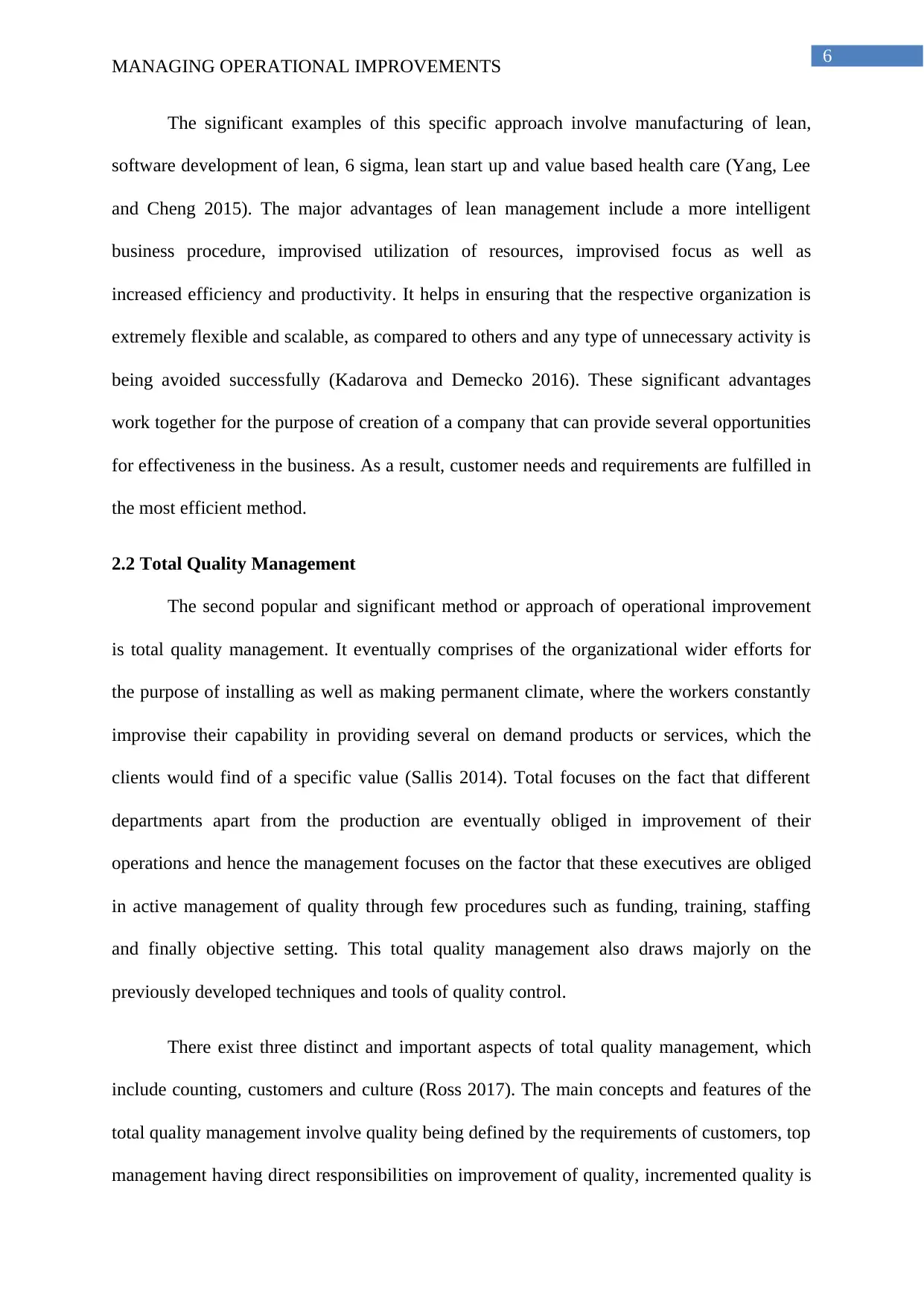
6
MANAGING OPERATIONAL IMPROVEMENTS
The significant examples of this specific approach involve manufacturing of lean,
software development of lean, 6 sigma, lean start up and value based health care (Yang, Lee
and Cheng 2015). The major advantages of lean management include a more intelligent
business procedure, improvised utilization of resources, improvised focus as well as
increased efficiency and productivity. It helps in ensuring that the respective organization is
extremely flexible and scalable, as compared to others and any type of unnecessary activity is
being avoided successfully (Kadarova and Demecko 2016). These significant advantages
work together for the purpose of creation of a company that can provide several opportunities
for effectiveness in the business. As a result, customer needs and requirements are fulfilled in
the most efficient method.
2.2 Total Quality Management
The second popular and significant method or approach of operational improvement
is total quality management. It eventually comprises of the organizational wider efforts for
the purpose of installing as well as making permanent climate, where the workers constantly
improvise their capability in providing several on demand products or services, which the
clients would find of a specific value (Sallis 2014). Total focuses on the fact that different
departments apart from the production are eventually obliged in improvement of their
operations and hence the management focuses on the factor that these executives are obliged
in active management of quality through few procedures such as funding, training, staffing
and finally objective setting. This total quality management also draws majorly on the
previously developed techniques and tools of quality control.
There exist three distinct and important aspects of total quality management, which
include counting, customers and culture (Ross 2017). The main concepts and features of the
total quality management involve quality being defined by the requirements of customers, top
management having direct responsibilities on improvement of quality, incremented quality is
MANAGING OPERATIONAL IMPROVEMENTS
The significant examples of this specific approach involve manufacturing of lean,
software development of lean, 6 sigma, lean start up and value based health care (Yang, Lee
and Cheng 2015). The major advantages of lean management include a more intelligent
business procedure, improvised utilization of resources, improvised focus as well as
increased efficiency and productivity. It helps in ensuring that the respective organization is
extremely flexible and scalable, as compared to others and any type of unnecessary activity is
being avoided successfully (Kadarova and Demecko 2016). These significant advantages
work together for the purpose of creation of a company that can provide several opportunities
for effectiveness in the business. As a result, customer needs and requirements are fulfilled in
the most efficient method.
2.2 Total Quality Management
The second popular and significant method or approach of operational improvement
is total quality management. It eventually comprises of the organizational wider efforts for
the purpose of installing as well as making permanent climate, where the workers constantly
improvise their capability in providing several on demand products or services, which the
clients would find of a specific value (Sallis 2014). Total focuses on the fact that different
departments apart from the production are eventually obliged in improvement of their
operations and hence the management focuses on the factor that these executives are obliged
in active management of quality through few procedures such as funding, training, staffing
and finally objective setting. This total quality management also draws majorly on the
previously developed techniques and tools of quality control.
There exist three distinct and important aspects of total quality management, which
include counting, customers and culture (Ross 2017). The main concepts and features of the
total quality management involve quality being defined by the requirements of customers, top
management having direct responsibilities on improvement of quality, incremented quality is
Paraphrase This Document
Need a fresh take? Get an instant paraphrase of this document with our AI Paraphraser
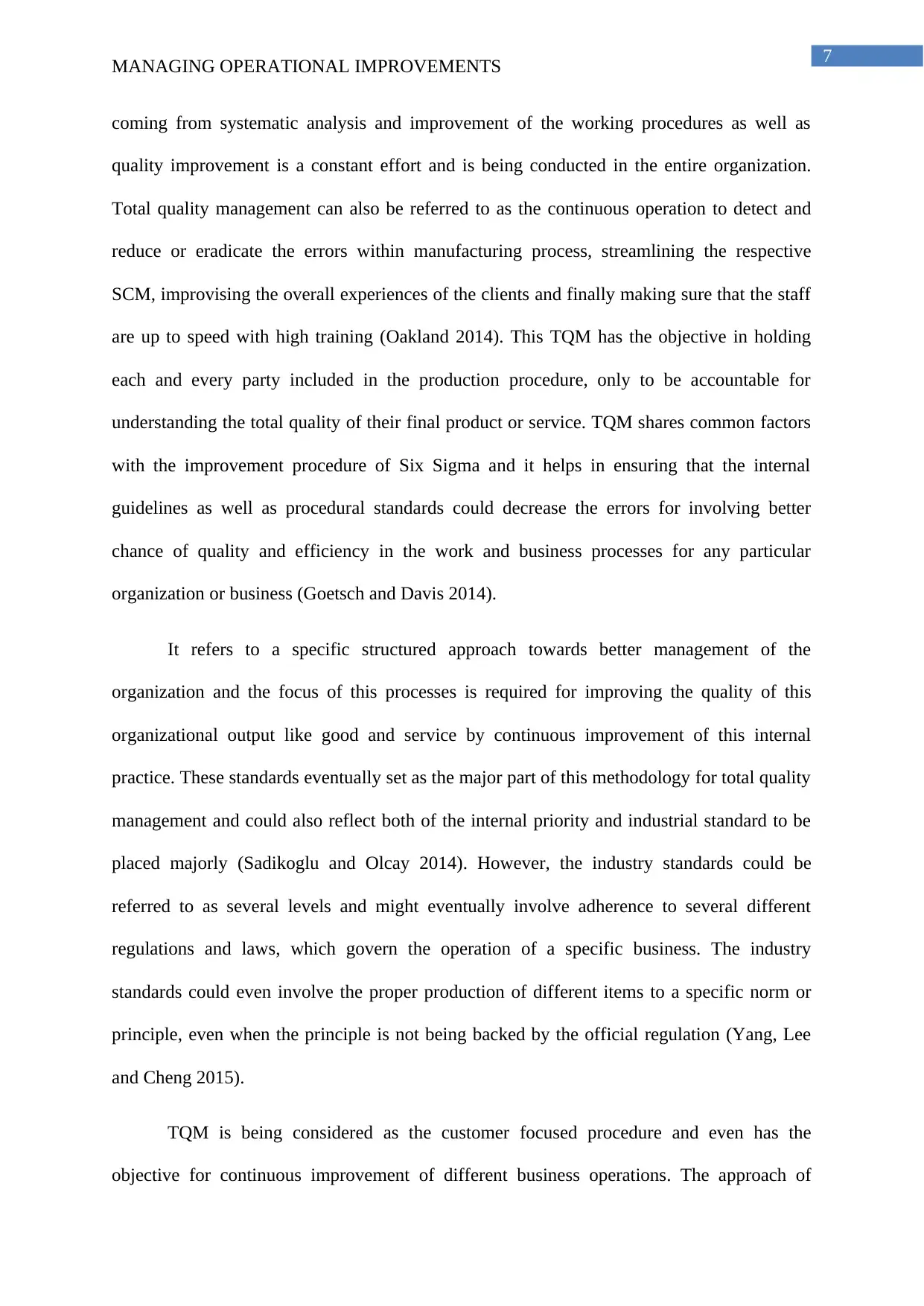
7
MANAGING OPERATIONAL IMPROVEMENTS
coming from systematic analysis and improvement of the working procedures as well as
quality improvement is a constant effort and is being conducted in the entire organization.
Total quality management can also be referred to as the continuous operation to detect and
reduce or eradicate the errors within manufacturing process, streamlining the respective
SCM, improvising the overall experiences of the clients and finally making sure that the staff
are up to speed with high training (Oakland 2014). This TQM has the objective in holding
each and every party included in the production procedure, only to be accountable for
understanding the total quality of their final product or service. TQM shares common factors
with the improvement procedure of Six Sigma and it helps in ensuring that the internal
guidelines as well as procedural standards could decrease the errors for involving better
chance of quality and efficiency in the work and business processes for any particular
organization or business (Goetsch and Davis 2014).
It refers to a specific structured approach towards better management of the
organization and the focus of this processes is required for improving the quality of this
organizational output like good and service by continuous improvement of this internal
practice. These standards eventually set as the major part of this methodology for total quality
management and could also reflect both of the internal priority and industrial standard to be
placed majorly (Sadikoglu and Olcay 2014). However, the industry standards could be
referred to as several levels and might eventually involve adherence to several different
regulations and laws, which govern the operation of a specific business. The industry
standards could even involve the proper production of different items to a specific norm or
principle, even when the principle is not being backed by the official regulation (Yang, Lee
and Cheng 2015).
TQM is being considered as the customer focused procedure and even has the
objective for continuous improvement of different business operations. The approach of
MANAGING OPERATIONAL IMPROVEMENTS
coming from systematic analysis and improvement of the working procedures as well as
quality improvement is a constant effort and is being conducted in the entire organization.
Total quality management can also be referred to as the continuous operation to detect and
reduce or eradicate the errors within manufacturing process, streamlining the respective
SCM, improvising the overall experiences of the clients and finally making sure that the staff
are up to speed with high training (Oakland 2014). This TQM has the objective in holding
each and every party included in the production procedure, only to be accountable for
understanding the total quality of their final product or service. TQM shares common factors
with the improvement procedure of Six Sigma and it helps in ensuring that the internal
guidelines as well as procedural standards could decrease the errors for involving better
chance of quality and efficiency in the work and business processes for any particular
organization or business (Goetsch and Davis 2014).
It refers to a specific structured approach towards better management of the
organization and the focus of this processes is required for improving the quality of this
organizational output like good and service by continuous improvement of this internal
practice. These standards eventually set as the major part of this methodology for total quality
management and could also reflect both of the internal priority and industrial standard to be
placed majorly (Sadikoglu and Olcay 2014). However, the industry standards could be
referred to as several levels and might eventually involve adherence to several different
regulations and laws, which govern the operation of a specific business. The industry
standards could even involve the proper production of different items to a specific norm or
principle, even when the principle is not being backed by the official regulation (Yang, Lee
and Cheng 2015).
TQM is being considered as the customer focused procedure and even has the
objective for continuous improvement of different business operations. The approach of
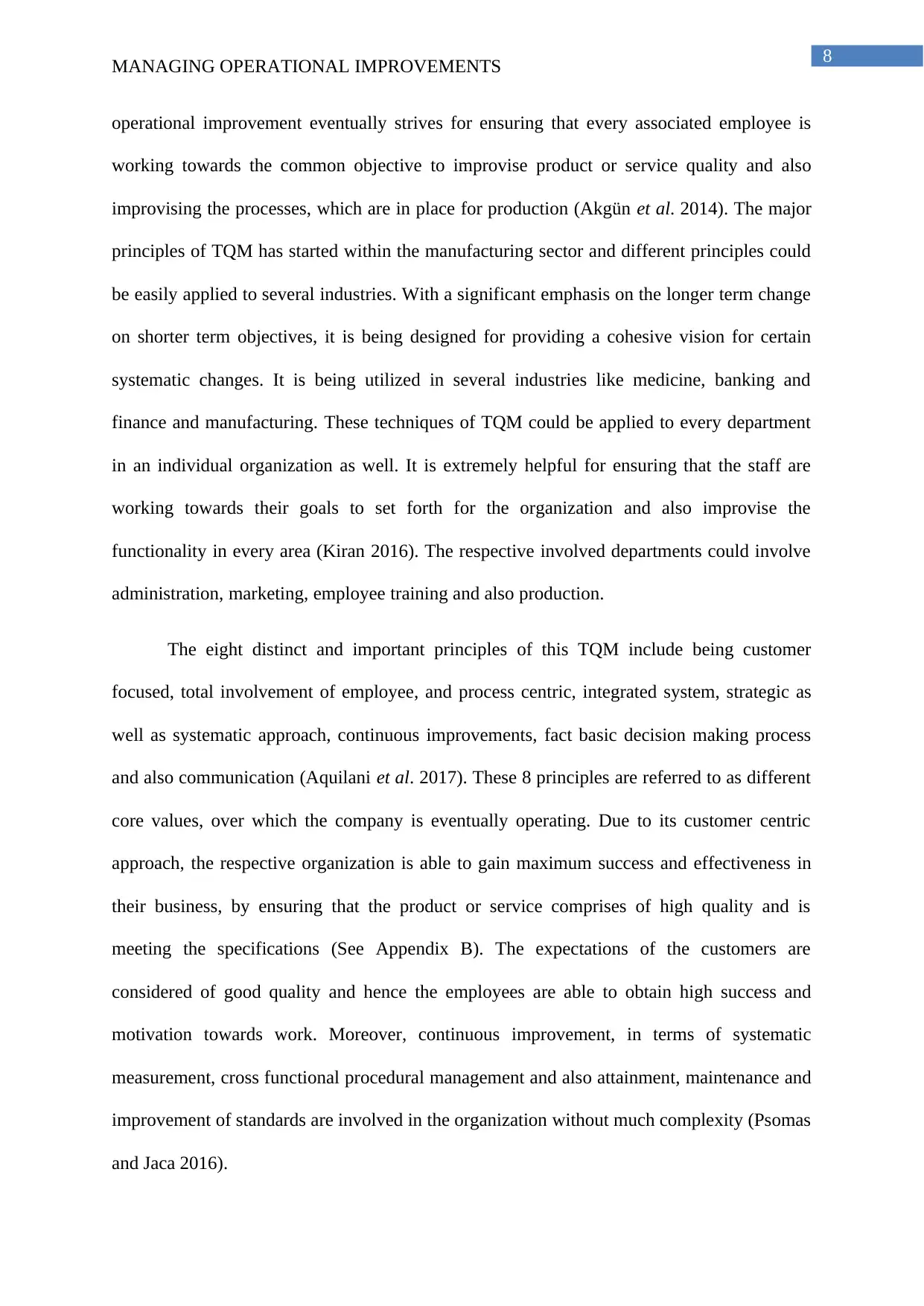
8
MANAGING OPERATIONAL IMPROVEMENTS
operational improvement eventually strives for ensuring that every associated employee is
working towards the common objective to improvise product or service quality and also
improvising the processes, which are in place for production (Akgün et al. 2014). The major
principles of TQM has started within the manufacturing sector and different principles could
be easily applied to several industries. With a significant emphasis on the longer term change
on shorter term objectives, it is being designed for providing a cohesive vision for certain
systematic changes. It is being utilized in several industries like medicine, banking and
finance and manufacturing. These techniques of TQM could be applied to every department
in an individual organization as well. It is extremely helpful for ensuring that the staff are
working towards their goals to set forth for the organization and also improvise the
functionality in every area (Kiran 2016). The respective involved departments could involve
administration, marketing, employee training and also production.
The eight distinct and important principles of this TQM include being customer
focused, total involvement of employee, and process centric, integrated system, strategic as
well as systematic approach, continuous improvements, fact basic decision making process
and also communication (Aquilani et al. 2017). These 8 principles are referred to as different
core values, over which the company is eventually operating. Due to its customer centric
approach, the respective organization is able to gain maximum success and effectiveness in
their business, by ensuring that the product or service comprises of high quality and is
meeting the specifications (See Appendix B). The expectations of the customers are
considered of good quality and hence the employees are able to obtain high success and
motivation towards work. Moreover, continuous improvement, in terms of systematic
measurement, cross functional procedural management and also attainment, maintenance and
improvement of standards are involved in the organization without much complexity (Psomas
and Jaca 2016).
MANAGING OPERATIONAL IMPROVEMENTS
operational improvement eventually strives for ensuring that every associated employee is
working towards the common objective to improvise product or service quality and also
improvising the processes, which are in place for production (Akgün et al. 2014). The major
principles of TQM has started within the manufacturing sector and different principles could
be easily applied to several industries. With a significant emphasis on the longer term change
on shorter term objectives, it is being designed for providing a cohesive vision for certain
systematic changes. It is being utilized in several industries like medicine, banking and
finance and manufacturing. These techniques of TQM could be applied to every department
in an individual organization as well. It is extremely helpful for ensuring that the staff are
working towards their goals to set forth for the organization and also improvise the
functionality in every area (Kiran 2016). The respective involved departments could involve
administration, marketing, employee training and also production.
The eight distinct and important principles of this TQM include being customer
focused, total involvement of employee, and process centric, integrated system, strategic as
well as systematic approach, continuous improvements, fact basic decision making process
and also communication (Aquilani et al. 2017). These 8 principles are referred to as different
core values, over which the company is eventually operating. Due to its customer centric
approach, the respective organization is able to gain maximum success and effectiveness in
their business, by ensuring that the product or service comprises of high quality and is
meeting the specifications (See Appendix B). The expectations of the customers are
considered of good quality and hence the employees are able to obtain high success and
motivation towards work. Moreover, continuous improvement, in terms of systematic
measurement, cross functional procedural management and also attainment, maintenance and
improvement of standards are involved in the organization without much complexity (Psomas
and Jaca 2016).
⊘ This is a preview!⊘
Do you want full access?
Subscribe today to unlock all pages.

Trusted by 1+ million students worldwide
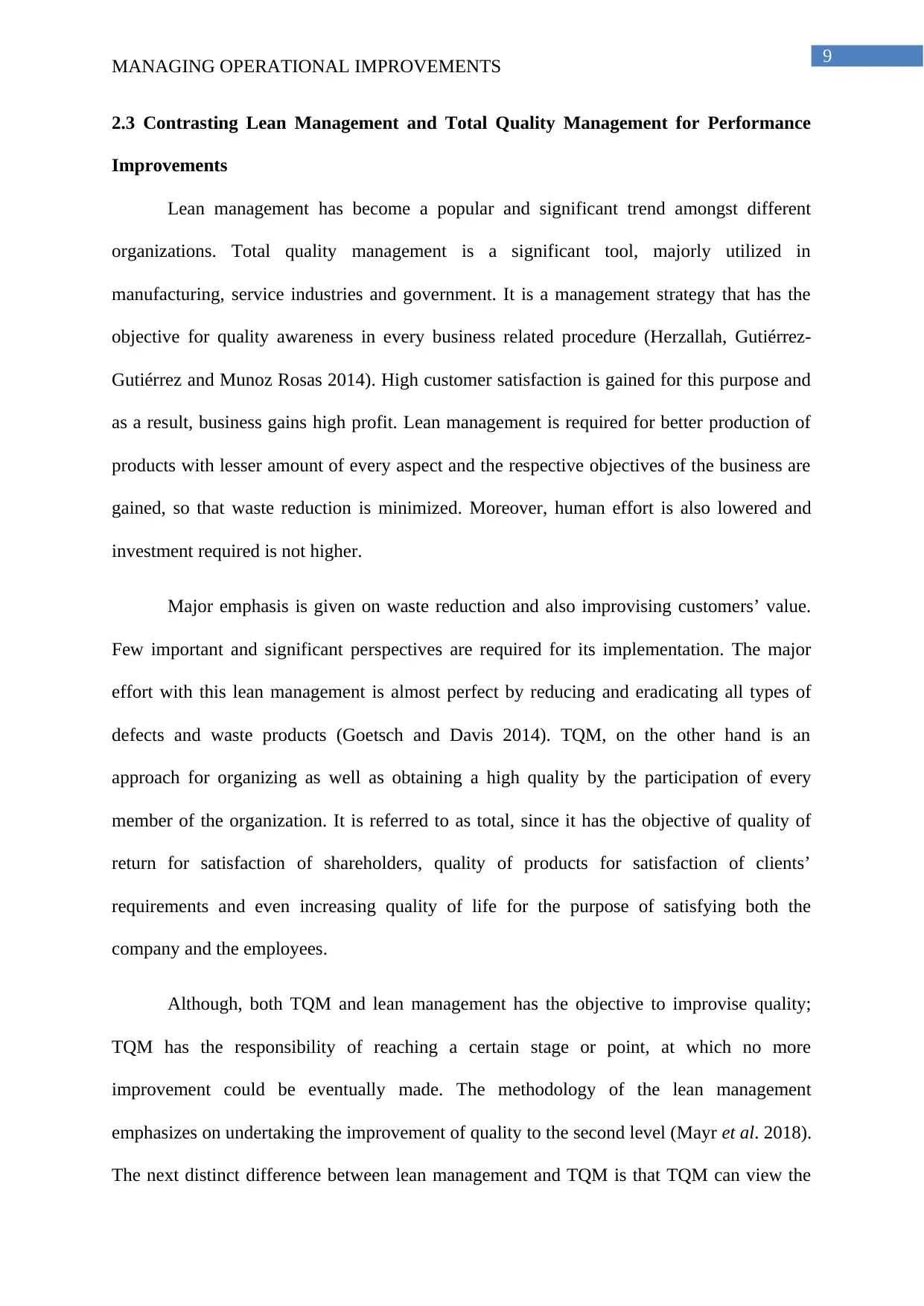
9
MANAGING OPERATIONAL IMPROVEMENTS
2.3 Contrasting Lean Management and Total Quality Management for Performance
Improvements
Lean management has become a popular and significant trend amongst different
organizations. Total quality management is a significant tool, majorly utilized in
manufacturing, service industries and government. It is a management strategy that has the
objective for quality awareness in every business related procedure (Herzallah, Gutiérrez-
Gutiérrez and Munoz Rosas 2014). High customer satisfaction is gained for this purpose and
as a result, business gains high profit. Lean management is required for better production of
products with lesser amount of every aspect and the respective objectives of the business are
gained, so that waste reduction is minimized. Moreover, human effort is also lowered and
investment required is not higher.
Major emphasis is given on waste reduction and also improvising customers’ value.
Few important and significant perspectives are required for its implementation. The major
effort with this lean management is almost perfect by reducing and eradicating all types of
defects and waste products (Goetsch and Davis 2014). TQM, on the other hand is an
approach for organizing as well as obtaining a high quality by the participation of every
member of the organization. It is referred to as total, since it has the objective of quality of
return for satisfaction of shareholders, quality of products for satisfaction of clients’
requirements and even increasing quality of life for the purpose of satisfying both the
company and the employees.
Although, both TQM and lean management has the objective to improvise quality;
TQM has the responsibility of reaching a certain stage or point, at which no more
improvement could be eventually made. The methodology of the lean management
emphasizes on undertaking the improvement of quality to the second level (Mayr et al. 2018).
The next distinct difference between lean management and TQM is that TQM can view the
MANAGING OPERATIONAL IMPROVEMENTS
2.3 Contrasting Lean Management and Total Quality Management for Performance
Improvements
Lean management has become a popular and significant trend amongst different
organizations. Total quality management is a significant tool, majorly utilized in
manufacturing, service industries and government. It is a management strategy that has the
objective for quality awareness in every business related procedure (Herzallah, Gutiérrez-
Gutiérrez and Munoz Rosas 2014). High customer satisfaction is gained for this purpose and
as a result, business gains high profit. Lean management is required for better production of
products with lesser amount of every aspect and the respective objectives of the business are
gained, so that waste reduction is minimized. Moreover, human effort is also lowered and
investment required is not higher.
Major emphasis is given on waste reduction and also improvising customers’ value.
Few important and significant perspectives are required for its implementation. The major
effort with this lean management is almost perfect by reducing and eradicating all types of
defects and waste products (Goetsch and Davis 2014). TQM, on the other hand is an
approach for organizing as well as obtaining a high quality by the participation of every
member of the organization. It is referred to as total, since it has the objective of quality of
return for satisfaction of shareholders, quality of products for satisfaction of clients’
requirements and even increasing quality of life for the purpose of satisfying both the
company and the employees.
Although, both TQM and lean management has the objective to improvise quality;
TQM has the responsibility of reaching a certain stage or point, at which no more
improvement could be eventually made. The methodology of the lean management
emphasizes on undertaking the improvement of quality to the second level (Mayr et al. 2018).
The next distinct difference between lean management and TQM is that TQM can view the
Paraphrase This Document
Need a fresh take? Get an instant paraphrase of this document with our AI Paraphraser
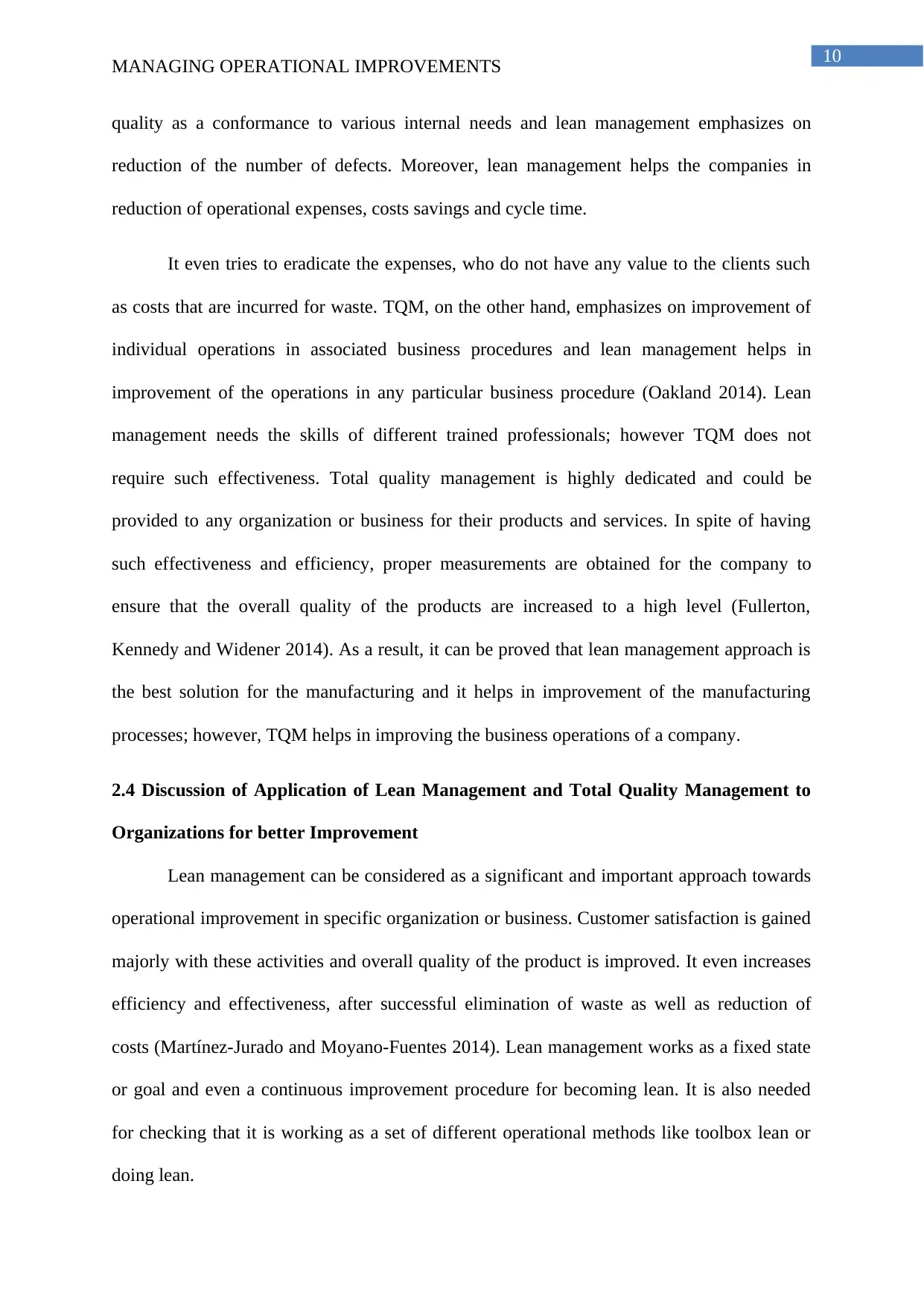
10
MANAGING OPERATIONAL IMPROVEMENTS
quality as a conformance to various internal needs and lean management emphasizes on
reduction of the number of defects. Moreover, lean management helps the companies in
reduction of operational expenses, costs savings and cycle time.
It even tries to eradicate the expenses, who do not have any value to the clients such
as costs that are incurred for waste. TQM, on the other hand, emphasizes on improvement of
individual operations in associated business procedures and lean management helps in
improvement of the operations in any particular business procedure (Oakland 2014). Lean
management needs the skills of different trained professionals; however TQM does not
require such effectiveness. Total quality management is highly dedicated and could be
provided to any organization or business for their products and services. In spite of having
such effectiveness and efficiency, proper measurements are obtained for the company to
ensure that the overall quality of the products are increased to a high level (Fullerton,
Kennedy and Widener 2014). As a result, it can be proved that lean management approach is
the best solution for the manufacturing and it helps in improvement of the manufacturing
processes; however, TQM helps in improving the business operations of a company.
2.4 Discussion of Application of Lean Management and Total Quality Management to
Organizations for better Improvement
Lean management can be considered as a significant and important approach towards
operational improvement in specific organization or business. Customer satisfaction is gained
majorly with these activities and overall quality of the product is improved. It even increases
efficiency and effectiveness, after successful elimination of waste as well as reduction of
costs (Martínez-Jurado and Moyano-Fuentes 2014). Lean management works as a fixed state
or goal and even a continuous improvement procedure for becoming lean. It is also needed
for checking that it is working as a set of different operational methods like toolbox lean or
doing lean.
MANAGING OPERATIONAL IMPROVEMENTS
quality as a conformance to various internal needs and lean management emphasizes on
reduction of the number of defects. Moreover, lean management helps the companies in
reduction of operational expenses, costs savings and cycle time.
It even tries to eradicate the expenses, who do not have any value to the clients such
as costs that are incurred for waste. TQM, on the other hand, emphasizes on improvement of
individual operations in associated business procedures and lean management helps in
improvement of the operations in any particular business procedure (Oakland 2014). Lean
management needs the skills of different trained professionals; however TQM does not
require such effectiveness. Total quality management is highly dedicated and could be
provided to any organization or business for their products and services. In spite of having
such effectiveness and efficiency, proper measurements are obtained for the company to
ensure that the overall quality of the products are increased to a high level (Fullerton,
Kennedy and Widener 2014). As a result, it can be proved that lean management approach is
the best solution for the manufacturing and it helps in improvement of the manufacturing
processes; however, TQM helps in improving the business operations of a company.
2.4 Discussion of Application of Lean Management and Total Quality Management to
Organizations for better Improvement
Lean management can be considered as a significant and important approach towards
operational improvement in specific organization or business. Customer satisfaction is gained
majorly with these activities and overall quality of the product is improved. It even increases
efficiency and effectiveness, after successful elimination of waste as well as reduction of
costs (Martínez-Jurado and Moyano-Fuentes 2014). Lean management works as a fixed state
or goal and even a continuous improvement procedure for becoming lean. It is also needed
for checking that it is working as a set of different operational methods like toolbox lean or
doing lean.
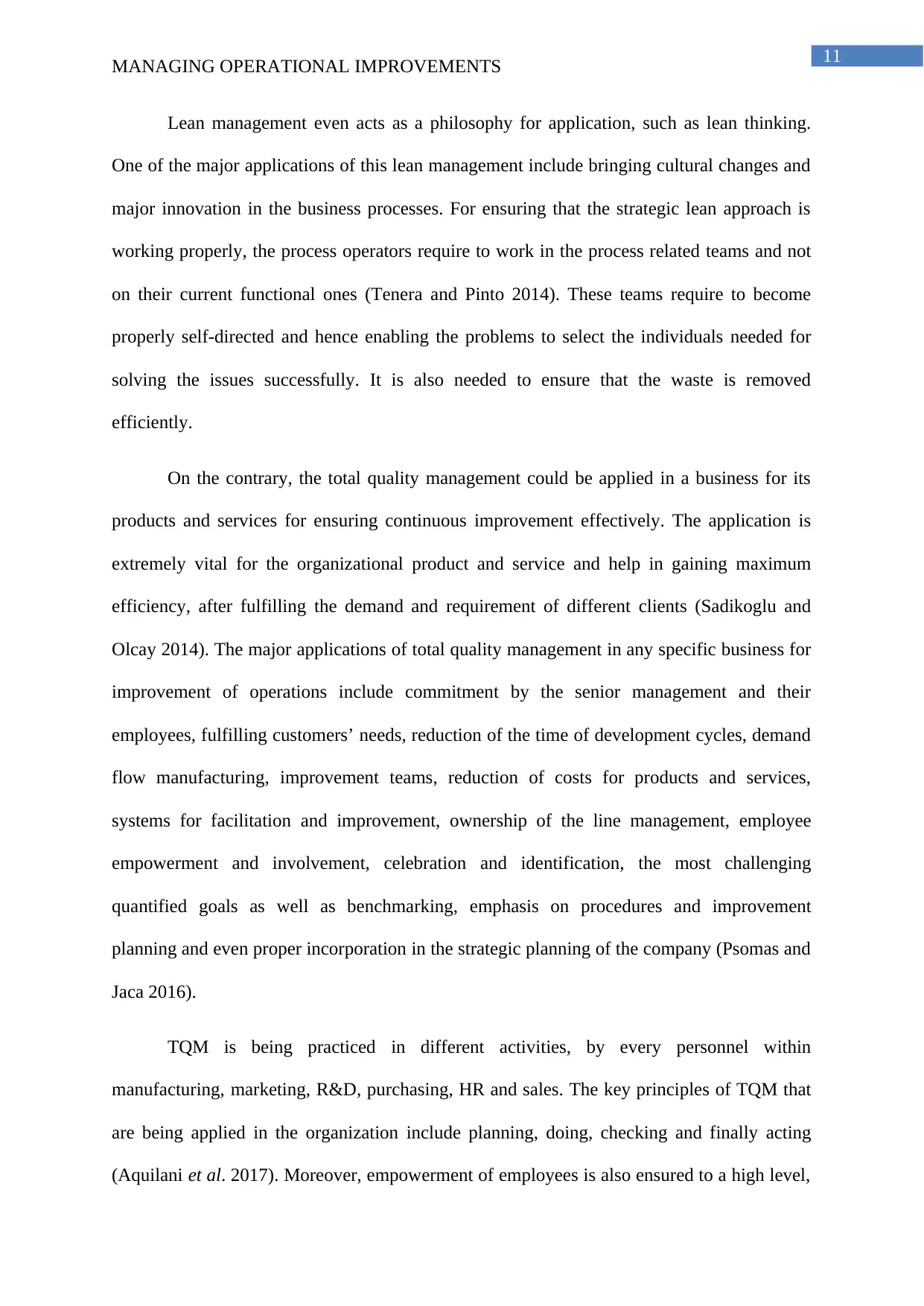
11
MANAGING OPERATIONAL IMPROVEMENTS
Lean management even acts as a philosophy for application, such as lean thinking.
One of the major applications of this lean management include bringing cultural changes and
major innovation in the business processes. For ensuring that the strategic lean approach is
working properly, the process operators require to work in the process related teams and not
on their current functional ones (Tenera and Pinto 2014). These teams require to become
properly self-directed and hence enabling the problems to select the individuals needed for
solving the issues successfully. It is also needed to ensure that the waste is removed
efficiently.
On the contrary, the total quality management could be applied in a business for its
products and services for ensuring continuous improvement effectively. The application is
extremely vital for the organizational product and service and help in gaining maximum
efficiency, after fulfilling the demand and requirement of different clients (Sadikoglu and
Olcay 2014). The major applications of total quality management in any specific business for
improvement of operations include commitment by the senior management and their
employees, fulfilling customers’ needs, reduction of the time of development cycles, demand
flow manufacturing, improvement teams, reduction of costs for products and services,
systems for facilitation and improvement, ownership of the line management, employee
empowerment and involvement, celebration and identification, the most challenging
quantified goals as well as benchmarking, emphasis on procedures and improvement
planning and even proper incorporation in the strategic planning of the company (Psomas and
Jaca 2016).
TQM is being practiced in different activities, by every personnel within
manufacturing, marketing, R&D, purchasing, HR and sales. The key principles of TQM that
are being applied in the organization include planning, doing, checking and finally acting
(Aquilani et al. 2017). Moreover, empowerment of employees is also ensured to a high level,
MANAGING OPERATIONAL IMPROVEMENTS
Lean management even acts as a philosophy for application, such as lean thinking.
One of the major applications of this lean management include bringing cultural changes and
major innovation in the business processes. For ensuring that the strategic lean approach is
working properly, the process operators require to work in the process related teams and not
on their current functional ones (Tenera and Pinto 2014). These teams require to become
properly self-directed and hence enabling the problems to select the individuals needed for
solving the issues successfully. It is also needed to ensure that the waste is removed
efficiently.
On the contrary, the total quality management could be applied in a business for its
products and services for ensuring continuous improvement effectively. The application is
extremely vital for the organizational product and service and help in gaining maximum
efficiency, after fulfilling the demand and requirement of different clients (Sadikoglu and
Olcay 2014). The major applications of total quality management in any specific business for
improvement of operations include commitment by the senior management and their
employees, fulfilling customers’ needs, reduction of the time of development cycles, demand
flow manufacturing, improvement teams, reduction of costs for products and services,
systems for facilitation and improvement, ownership of the line management, employee
empowerment and involvement, celebration and identification, the most challenging
quantified goals as well as benchmarking, emphasis on procedures and improvement
planning and even proper incorporation in the strategic planning of the company (Psomas and
Jaca 2016).
TQM is being practiced in different activities, by every personnel within
manufacturing, marketing, R&D, purchasing, HR and sales. The key principles of TQM that
are being applied in the organization include planning, doing, checking and finally acting
(Aquilani et al. 2017). Moreover, empowerment of employees is also ensured to a high level,
⊘ This is a preview!⊘
Do you want full access?
Subscribe today to unlock all pages.

Trusted by 1+ million students worldwide
1 out of 17
Related Documents
Your All-in-One AI-Powered Toolkit for Academic Success.
+13062052269
info@desklib.com
Available 24*7 on WhatsApp / Email
![[object Object]](/_next/static/media/star-bottom.7253800d.svg)
Unlock your academic potential
Copyright © 2020–2026 A2Z Services. All Rights Reserved. Developed and managed by ZUCOL.





